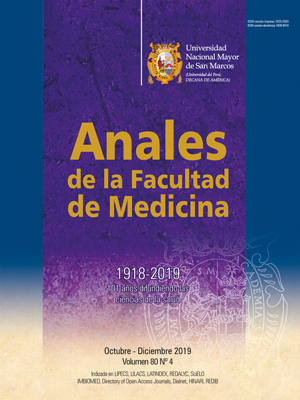Interamerican Cooperative Service of Public Health: A history of 20 years of collaboration with Peru
DOI:
https://doi.org/10.15381/anales.v80i4.17254Keywords:
Salud Pública, Historia de la Medicina, Capacitación, PerúAbstract
This article presents testimonial and bibliographic information about the history of the “Service Cooperative Inter-American of Public Health” (SCISP) in Peru during the period between 1942-1962, in the context of the implementation of the “Good Neighbor Policy” from the United States Government in its relations with Latin American. The first purpose of this article is to discuss the scope and limitations of technification and modernization public health programs which were developed by SCISP in our country; and second, discuss the importance of their training, and professional development programs in the development of a new generation of sanitarians who consensualmously defined in 1962, the doctrinal principles of the national public health, rooted in local realities, which it was influential in the official public health policy in the next decades.
Downloads
Published
Issue
Section
License
Copyright (c) 2019 Anales de la Facultad de Medicina

This work is licensed under a Creative Commons Attribution-NonCommercial-ShareAlike 4.0 International License.
Those authors who have publications with this magazine accept the following terms:
- Authors will retain their copyrights and guarantee the journal the right of first publication of their work, which will be simultaneously subject to Creative Commons Attribution License that allows third parties to share the work as long as its author and its first publication this magazine are indicated.
- Authors may adopt other non-exclusive licensing agreements for the distribution of the version of the published work (eg, deposit it in an institutional electronic file or publish it in a monographic volume) provided that the initial publication in this magazine is indicated.
- Authors are allowed and recommended to disseminate their work over the Internet (eg: in institutional telematic archives or on their website) before and during the submission process, which It can produce interesting exchanges and increase quotes from the published work. (See El efecto del acceso abierto ).



